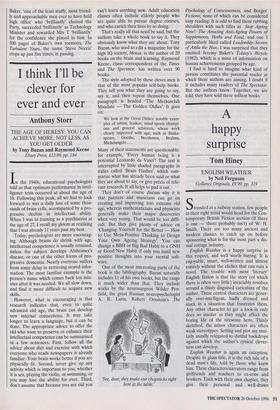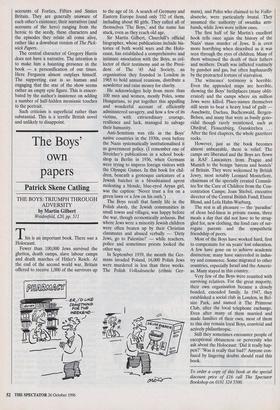A happy surprise
Tom Hiney
ENGLISH WEATHER by Neil Ferguson Gollancz Originals, £9.99, pp. 319 Stranded at a railway station, few people in their right mind would head for the Con- temporary British Fiction section (if there is one — there probably isn't) of W. H. Smith. There are too many ancient and modern classics to catch up on before sponsoring what is for the most part a dis- mal cottage industry.
English Weather is a happy surprise in this respect, and well worth buying. It is enjoyable, smart, well-written and almost entirely without the clichés that can ruin a novel. The trouble with most 'literary' English fiction is that the story (of which there is often very little) invariably revolves around a thinly disguised caricature of the author. These central characters are gener- ally over-intelligent, badly dressed and stuck in a situation that frustrates them. Any other character to get a look-in only does so insofar 'as they might affect the boring life of the tiresome hero. Thinly sketched, the minor characters are often weak stereotypes. Setting and plot are simi- larly usually relegated to dutiful backdrops against which the author's cynical clever- ness can develop.
English Weather is again an exception. Despite its glum title, it is the rich tale of a dead man's life, told by those who knew him. These characters/narrators range from girlfriends and teachers to ex-cons and hookers. Each with their own chapter, they give their personal and well-drawn accounts of Forties, Fifties and Sixties Britain. They are generally unaware of each other's existence; their narratives (and accounts of the hero) ranging from the heroic to the seedy, these characters and the episodes they relate all come alive, rather like a downbeat version of The Pick- wick Papers.
The central character of Gregory Harris does not have a narrative. The intention is to make him a haunting presence in the book — a personification of our times. Here Ferguson almost outplays himself. The supporting cast is so human and engaging that the star of the show seems rather an empty epic figure. This is exacer- bated by the author's insistence on adding a number of half-hidden messianic touches to the portrait.
Such criticism is superficial rather than substantial. This is a terrific British novel and unlikely to disappoint.



















































































 Previous page
Previous page